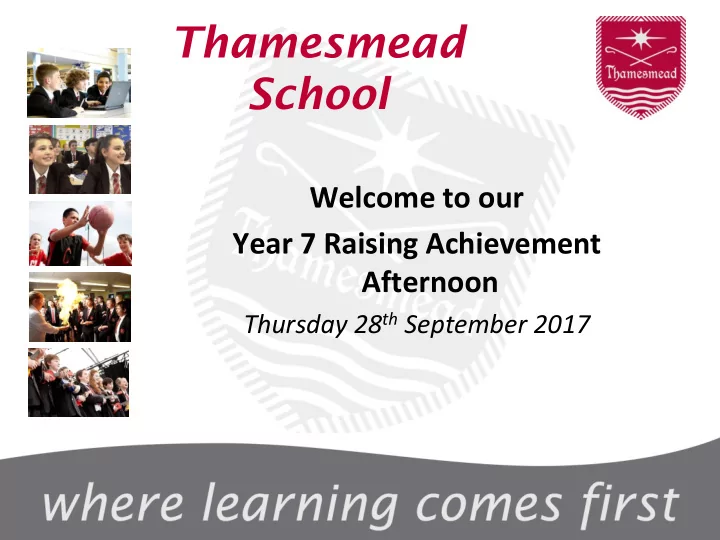

Thamesmead School Welcome to our Year 7 Raising Achievement Afternoon Thursday 28 th September 2017
What we will cover this evening • Target setting and changes to the GCSE grading system • How are the Y7s settling in? • Supporting your child • Communication between home and school • Rewards and behaviour policy • Successes so far • Safeguarding • Key information for English and Maths • Top tips • Tutor appointments
Target setting
Changes to the GCSE grading system G F E D C B A A* 1 2 3 4 5 6 7 8 9
How are the Y7s settling in? • Is your son/daughter enjoying school? • Are they organised? • Are they managing the home learning expectations? • Are they behaving in a way that supports learning? • Have they joined any clubs? • Are they getting involved in inter-house competitions?
Supporting your child
Communicating • Parent Portal • Email- all staff emails on website • Planner • Phone calls • Text messages • Letters
Rewards
Behaviour Policy • Homework- 30mins • Equipment- 30mins • Uniform- 30mins • Late- 30mins • Behaviour- 30mins – Verbal Warning – Negative comment – Detention – On call – removal from lesson – two hour detention
Successes so far…
Safe Guarding https://www.youtube.com/watch?v=sch_WMjd6go https://www.thinkuknow.co.uk/
Year 7 English: What to expect Autumn 1 Autumn 2 Spring 1 Amazing people Private Peaceful Introduction to Reading, analysing and being Engaging with a Morpurgo Poetry inspired to write by role text at a deeper analytical Analysing and interpreting models from different level. Exploring theme and different forms and periods disciplines context. of poetry, mapping the genre’s transition through time. Spring 2 Summer 1 Summer 2 Introduction to Understanding and Spoken language Shakespeare creating detective study Reading, watching, Interpreting how we use the fiction examining different spoken word to achieve a Following the adventures of Shakespearean texts – a range of purposes and what Sherlock Holmes and John synoptic unit it reveals about how we Watson with a view to shape our identities and writing own crime fiction. personas. Fortnightly: Reading lessons in the Learning Resource Centre, supported by the use of the Accelerated Reader programme.
Types of reading at secondary school Skimming Your child will need to use at least one of these in most of their 5 lessons per day. Scanning That is a real challenge for weak or less confident readers. They need to constantly develop Zooming and hone their reading skills. How? Regular reading!
INSTANT IDEAS • Let your child choose what to read, rather than choosing what you think they should read • Encourage your child to read magazines, newspapers and online articles as well as books • Talk to your child about books or magazines you have not enjoyed, as well as things you love • Buy books as presents – don’t forget TV tie -ins and links to film releases
Why do some parents dread the question… “Can you help me with my Maths home learning?” Personal bad experiences at school. Worried that your children are better than you are. Fear of using/teaching the wrong method. Simply not knowing how to.
What help is available www.mathswatchvle.com Every teacher has an ‘open - door’ policy KS3 study room
What help is available https://vle.mathswatch.co.uk/vle/ LINK TO MATHSWATCH TO SHOW A SHORT CLIP
If you can’t help, what next? DON’T panic! Check the due date. Send your child in to see their teacher before the due date. If they turn up on the due date and say “I couldn’t do it!”, they will be sanctioned.
Most of all, be positive..! “We know from research that as soon as mothers say that they were ‘no good at maths ’, their daughters achievement in the subject goes down in that same school term.” - Professor Jo Boaler of Stanford University
Top tips… • Build a routine • Talk to your child about school – ask them more than “how was your day?” • Know how your child is getting on – Parent Portal • Talk about social media
Key dates • Monday 23 rd April 2018 Progress Review meetings • Monday 11 th June 2018 Year 7 exams start
Tutor Meetings • In the hall • 5 minute appointments • Waiting area available in the hall • Tutors will call you in turn • Refreshments on sale by World Challenge students
Recommend
More recommend